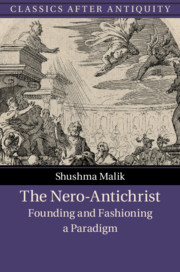Refine search
Actions for selected content:
23990 results in Ancient history
Appendices
-
- Book:
- Gargilius Martialis: The Agricultural Fragments
- Published online:
- 13 March 2020
- Print publication:
- 02 April 2020, pp 309-322
-
- Chapter
- Export citation
Frontmatter
-
- Book:
- Gargilius Martialis: The Agricultural Fragments
- Published online:
- 13 March 2020
- Print publication:
- 02 April 2020, pp i-iv
-
- Chapter
- Export citation
Plates
-
- Book:
- Gargilius Martialis: The Agricultural Fragments
- Published online:
- 13 March 2020
- Print publication:
- 02 April 2020, pp ix-x
-
- Chapter
- Export citation
Contents
-
- Book:
- Gargilius Martialis: The Agricultural Fragments
- Published online:
- 13 March 2020
- Print publication:
- 02 April 2020, pp vii-viii
-
- Chapter
- Export citation
Index Verborvm
-
- Book:
- Gargilius Martialis: The Agricultural Fragments
- Published online:
- 13 March 2020
- Print publication:
- 02 April 2020, pp 384-390
-
- Chapter
- Export citation
Commentary
-
- Book:
- Gargilius Martialis: The Agricultural Fragments
- Published online:
- 13 March 2020
- Print publication:
- 02 April 2020, pp 115-308
-
- Chapter
- Export citation
Abbreviations and Bibliography
-
- Book:
- Gargilius Martialis: The Agricultural Fragments
- Published online:
- 13 March 2020
- Print publication:
- 02 April 2020, pp 323-352
-
- Chapter
- Export citation
Text, Critical Apparatus and Translation
-
- Book:
- Gargilius Martialis: The Agricultural Fragments
- Published online:
- 13 March 2020
- Print publication:
- 02 April 2020, pp 89-114
-
- Chapter
- Export citation
Index Locorvm
-
- Book:
- Gargilius Martialis: The Agricultural Fragments
- Published online:
- 13 March 2020
- Print publication:
- 02 April 2020, pp 353-367
-
- Chapter
- Export citation
Plates
-
- Book:
- Gargilius Martialis: The Agricultural Fragments
- Published online:
- 13 March 2020
- Print publication:
- 02 April 2020, pp 391-406
-
- Chapter
- Export citation
Sigla
-
- Book:
- Gargilius Martialis: The Agricultural Fragments
- Published online:
- 13 March 2020
- Print publication:
- 02 April 2020, pp 87-88
-
- Chapter
- Export citation
Index Nominvm Et Rervm
-
- Book:
- Gargilius Martialis: The Agricultural Fragments
- Published online:
- 13 March 2020
- Print publication:
- 02 April 2020, pp 368-383
-
- Chapter
- Export citation
Figures
-
- Book:
- Gargilius Martialis: The Agricultural Fragments
- Published online:
- 13 March 2020
- Print publication:
- 02 April 2020, pp xi-xi
-
- Chapter
- Export citation
Dedication
-
- Book:
- Gargilius Martialis: The Agricultural Fragments
- Published online:
- 13 March 2020
- Print publication:
- 02 April 2020, pp v-vi
-
- Chapter
- Export citation
Introduction
-
- Book:
- Gargilius Martialis: The Agricultural Fragments
- Published online:
- 13 March 2020
- Print publication:
- 02 April 2020, pp 1-86
-
- Chapter
- Export citation

The Nero-Antichrist
- Founding and Fashioning a Paradigm
-
- Published online:
- 27 March 2020
- Print publication:
- 16 April 2020
Maps
-
- Book:
- The Cambridge World History of Violence
- Published online:
- 13 March 2020
- Print publication:
- 26 March 2020, pp xiv-xiv
-
- Chapter
- Export citation
Part II - Prehistoric and Ancient Warfare
-
- Book:
- The Cambridge World History of Violence
- Published online:
- 13 March 2020
- Print publication:
- 26 March 2020, pp 179-296
-
- Chapter
- Export citation
Introduction
-
-
- Book:
- Herodotus in the Long Nineteenth Century
- Published online:
- 13 March 2020
- Print publication:
- 26 March 2020, pp 1-19
-
- Chapter
- Export citation
Part III - Intimate and Collective Violence
-
- Book:
- The Cambridge World History of Violence
- Published online:
- 13 March 2020
- Print publication:
- 26 March 2020, pp 297-438
-
- Chapter
- Export citation
